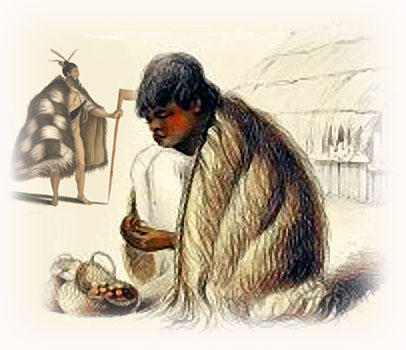Home - Kiwi Songs - Maori Songs - Search - Donate
This old haka, with its vivid portrayal of a young man's first sexual encounter, would have been learnt by Te Rauparaha in his teen-age years. He recited a parody of it after hiding beneath Te Rangikoaea's skirts.
|
Kikiki
kakaka! |
I'm
jabbering and quivering, |
|
|
 "Motupoi Pah with Tongariro" - George Angas 1844 |
Te Rauparaha's escape
Sir John Grace recounts how Te Rauparaha arrived at the northen shore of Lake Taupo in about 1810 and was told that Ngati Te Aho chiefs Tauteka and Te Riupawhara were waiting to destroy him, in revenge for killing their kin and desecrating their bodies.
So he made his escape south, heading for the Rangipo desert and the Whanganui coast. He sailed down to the south west shore of the lake then travelled up the Ponanga Track to Motu-o-puhi Pa situated on an island in Lake Rotoaira.
The Ngati Aho war party arrived in hot pursuit, and the Motuopuhi chief Wharerangi invited them in to search the place. He had hidden the fugitive in a kumara pit and had told his wife, Te Rangikoaea, to sit on top of it.Half-suffocating and with the nether regions of Te Rangikoaea millimetres his face, Te Rauparaha recalled the words of the old haka he had learnt as a teenager. "Kikiki kakaka,... Kei waniwania taku tara... (Shaking and quivering, I'm brushed by your crotch)
Fear gripped him when he heard the war party arrive, "Ka wehi au, and he realized he was caught in a trap. "Mau au e koro e.... He thought he was done for when the chief's wife moved away. "Ka mate, ka mate... But his pursuers had departed. "Ka ora, ka ora... Instead he saw the hairy legs of the local chief who had hid him. "Tenei te tangata puhuruhuru... Exhausted, humiliated, half-suffocated and in shock, he climbed up out into the sunshine. "Whiti te ra... He gave vent to his feelings of relief by chanting the bawdy old "Kikiki" haka out loud.
 Te Rangikoaea sat on top of the kumara pit |
Te Rauparaha's haka
Civil war gripped the land over the next 30 years. Warring factions obtained firearms from European traders in return for flax fibre and land. Te Rauparaha developed a trading and raiding base on Kapiti Island and grew in status to overlord of central New Zealand, from Whanganui to Kaikoura.
Then unimagined thousands of Europeans flooded onto the land that had been traded to them, and they started forcing their way onto Maori-owned land as well. Te Rauparaha became a respected, if feared, national leader in the Maori opposition to these foreign usurpers.
Kikiki/Ka Mate became known as Te Rauparaha's haka, as the story of his ingenious response to overwhelming odds gave this old haka a new interpretation that provided a morale booster to those facing the flood of British settlers.The British were prudes concerning sexual stories, so they were told that the first section of the haka explained how the incantations of his enemies were absorbed by Te Rangikoaea, while the second section told how Te Rauparaha had to whisper to her to prevent her moving away to her sleeping hut to satisfy her sexually aroused husband.
In truth, Wharerangi would have had a lot more urgent matters on his mind than taking his wife away for a spot of conjugal relaxation. He was faced with a vigilante group who would have annihilated his entire village if they had got an inkling that he was assisting Te Rauparaha. However this explanation of the words allowed the haka to be used in the presence of British settlers whose distorted morality condemned sexual frankness, even though they approved of wholesale land theft.
As the years have passed by, Kikiki/Ka Mate has gone from being a haka 'about' Te Rauparaha to one 'composed by' Te Rauparaha, although James Cowan wrote in 1935
"There is no good Maori authority for this story. The fact is that "Ka mate, ka mate," and the rest of it is a very old chant, long antedating Te Rauparaha's period."
A caring home for Kikiki
Kikiki is far too complex and subtle to be an off-the-cuff composition by one man who was exhaused, frightened and half-suffocated. He would only have been capable of chanting fragments of verses already well known to him.
In actual practice, composition of a top-quality haka was a group process of intelligent creative effort. Members of the group customarily trialled and modified the words and actions. It could take them weeks to shape the words into a format elemental enough to last through the centuries. Arapete Awatere explained to Mervyn McLean (1996) that"Most songs were composed as a group effort, even though one person was credited with the song. Songs were reworked ... to make the song appropriate to the new context."
However, when the Ngati Toa people attributed the haka to Te Rauparaha, they increased its mana and also gave it a 'turangawaewae,' a place where it belonged and where it was cared for. In a similar manner, Pokarekare Ana, from Northland, was said to be 'composed by' East Coaster Paraire Tomoana. And Derek Lardelli was named as composer of Kapa o Panga, a slightly modified version of the 1924 All Black haka.
NEXT - 12. Te Rauparaha's life. Home - Kiwi Songs - Maori Songs - Search - Donate
Patricia Burns, Te Rauparaha, A New Perspective (Penguin, 1983) pp 44-48.
James Cowan,
The Maoris in the Great War: (Maori Regimental Committee, Auckland, 1926) p 181.
Ka Mate, Ka Mate, (NZ Railways Magazine, February 1, 1935)John Te H Grace, Tuwharetoa : the history of the Maori people of the Taupo district. (Reed, 1959)
Mervyn McLean, Maori Music (University of Auckland Press 1996)
Published on Folksong.org.nz in Sept 2008
© 2008 by John Archer